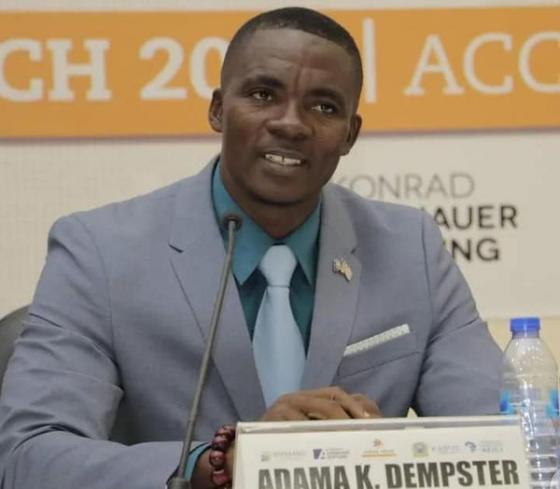‘Senate Proposals, Unnecessary Delay, Waste of Resources’

Secretary-General, Adama K. Dempster
-- Says CSO Platform
The Civil Society Human Rights Advocacy Platform of Liberia has raised serious concern over the Senate decision to set up a Transitional Justice Commission (TJC) to perform several tasks recommended by the erstwhile Truth and Reconciliation Commission.
The platform in a press statement signed by its Secretary-General, Adama K. Dempster, said the action of the Senate to propose a transitional justice commission, setting aside the legal provisions of the Truth and Reconciliation Commission (TRC) Act of 2005, is geared towards ‘unnecessary delay, waste of resources and undermining the people’s quest for justice’.
“We take note of the ongoing hearing at the Liberian Senate requesting expert opinion on the matter. However, let it be made clear that in our quest for peace and reconciliation, there can be no peace without justice,” he said. “Therefore, we call on the Senate to play its rightful role as House of Elders and not be a party to the promotion of the culture of impunity in Liberia.”
It can be recalled that the Senate, a few weeks ago, informed President George Weah that the establishment of such a commission is necessary to determine whether the TRC recommendations have not been fully and timely implemented.
The Senate argued that the transitional justice commission, when established, will examine the effect of the August 2003 Act of the Legislature, which granted general amnesty to all participants in the civil crisis, a major obstacle to the prosecutions of warlords.
The commission, the Senate said, will then determine if the TRC commissioners comply with the mandate such as the face-to-face meeting between perpetrators of war crimes and their respective victims, in light of allegations from some former warlords that the TRC never contacted them.
However, Dempster said the establishment of the commission proposed by the Senate would lead to the commission performing works that have already been carried out by the TRC.
According to Dempster, the TRC commission in 2009, among other things, provided analysis of the country’s troubled past, including the gross human rights violations committed during the 14-year conflict, which needs to be utilized now instead of setting up another commission.
“It also provided recommendations germane to the country’s post-conflict governance reform needs, accountability and social cohesion drives, development aspirations, and redress for victims. Nevertheless, the bulk of the recommendations have not been implemented by the Liberian government,” he said.
Referring to 2005, Dempster said the National Transitional Legislative Assembly enacted a law to establish the TRC under Article IV (4), to promote national peace, security, unity, and reconciliation through investigating gross human rights violations and violations of international humanitarian law.
It also called for a focus on the exploitation of natural or public resources to perpetuate armed conflicts, during the period January 1979 to October 14, 2003, and to determine whether these were isolated incidents or part of a systematic pattern.
“Although Article X (10), section 48 of the TRC Act required the president of the Republic of Liberia to report regularly on the implementation of the commission’s recommendations, there have been delays in submitting progress reports since the CDC led government came into office in 2018,” Dempster argued.
He noted that Article X, section 46 conferred upon the Independent National Human Rights Commission (INHRC) the responsibility to ensure that all the recommendations contained in the Report of the TRC are implemented and that civil society organizations and moral guarantors of the CPA shall be seized of the responsibility to monitor, and campaign for the scrupulous implementation of all recommendations contained in the report.”
Dempster said according to the law, therefore, the INCHR should assume the authority to ensure the implementation of the recommendations of the TRC in Liberia instead of setting up TJC.
“In addition to the implementation of the recommendations of the TRC report, he said, “the government of Liberia in 2016, through the Ministry of Justice, submitted its state party report to the implementation of the International Covenant on Civil and Political Rights (ICCPR), which highlighted efforts on the implementation of the TRC report to the United Nations Human Rights Committee in Geneva and participated in the revision and adoption of side report in 2018.”
Dempster said the UN Human Rights Committee, in its concluding Observations in July 2018, recommended that the “State party should as a matter of priority establish a process of accountability for past gross human rights violations and war crimes that conforms to international standards including victims’ access to justice, due process, and fair trial guarantees, and witness protection.
He added the committee also called for the State party to ensure that all alleged perpetrators of gross human rights violations and war crimes are impartially prosecuted and, if found guilty, convicted and punished per the gravity of the acts committed, regardless of their status or any domestic legislation on immunities.
“Take all measures necessary to implement the TRC recommendations and consider establishing a well-resourced body comprising government representatives, the Independent National Commission on Human Rights, and civil society organizations, to monitor the implementation of those recommendations.
“Also, develop and implement a comprehensive reparations scheme for all victims of gross human rights violations and war crimes. And redouble its efforts aimed at fostering reconciliation and sustaining peace, with the participation of victims and their families as well as civil society organizations active in seeking justice for past crimes,” Dempster added.
